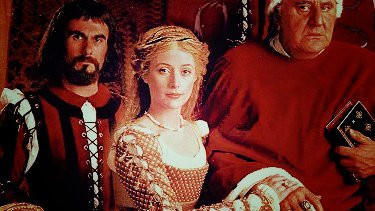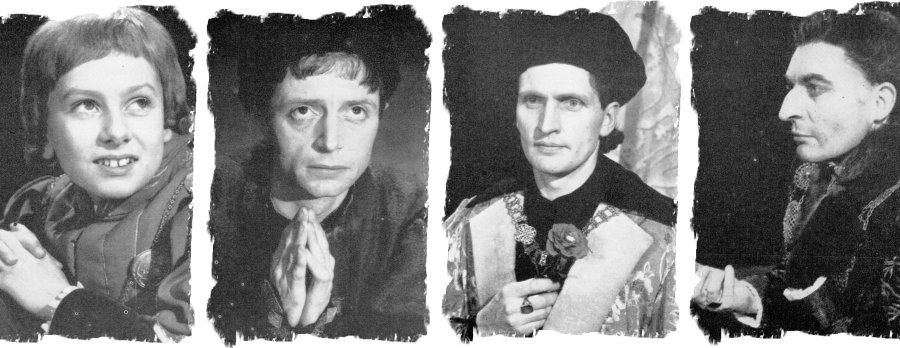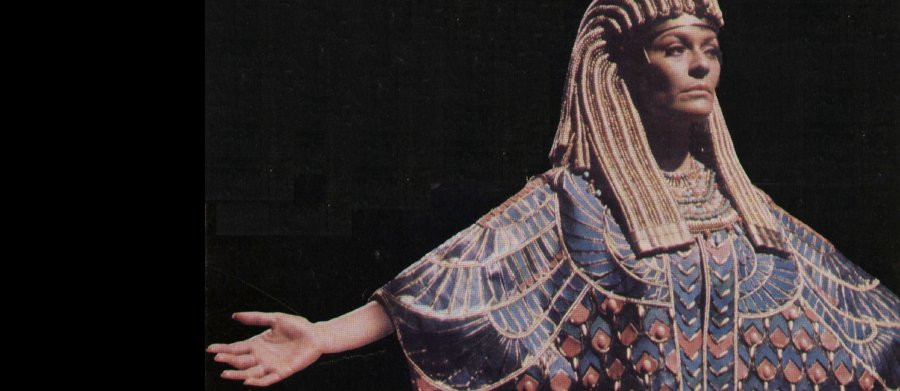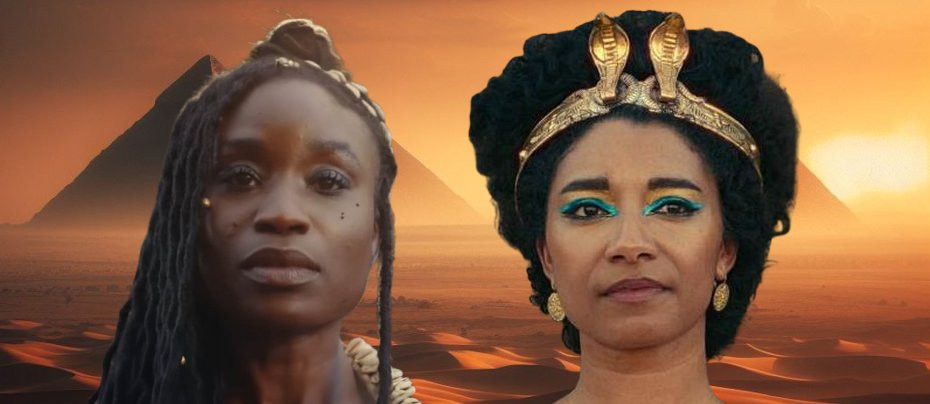
African Queens
2023 - Uk UsaReview by John Winterson Richards
Some might be astonished to see the Netflix dramatised documentary African Queens even mentioned on Television Heaven, a website dedicated to preserving the memory of the best in television, given how mercilessly its second season, Queen Cleopatra, was mocked on all sides. Indeed, the main reason for this qualified defence of the project as a whole is a feeling that the not unjustified opprobrium heaped on Queen Cleopatra has, retrospectively and unfairly, spilled over on to the first season, African Queens: Njinga, which does not deserve it and which is actually rather good.
Njinga is certainly successful in performing the primary function of a documentary in that it is very informative about a fascinating historical figure of whom this reviewer - who, in all due modesty, knows a thing or two about history - was previously unaware. Fact checking afterwards confirmed that the basic story it tells is true. Queen Njinga or Nzinga was truly a remarkable 17th Century ruler in what is today Angola. She showed great diplomatic skill leading a mission to the Colonial Portuguese, then later replaced her brother as Monarch, made a strategic marriage that secured an alliance with a powerful enemy, took over a new Kingdom after being driven out of her own, and eventually recovered much of that one too and maintained its independence, expertly playing off one European Colonial power against another in the process.
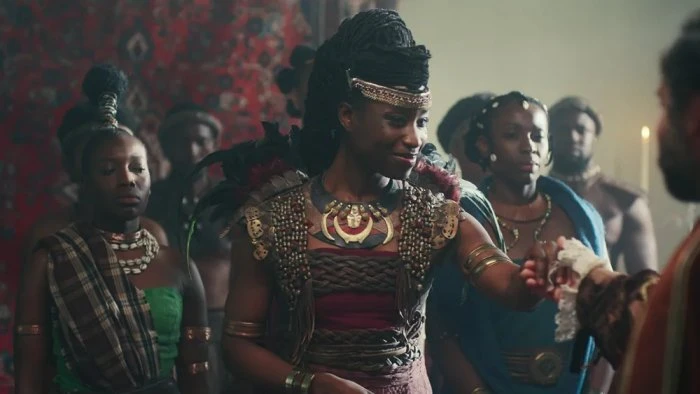
This is definitely a woman who deserves to be better known and all credit to African Queens for telling her story. However, the same fact checking also revealed that, in telling the story from her viewpoint, much is omitted. Angola before the Portuguese conquest was not as idyllic as depicted here: it was a violent place with a well-developed warrior culture. Njinga thrived in that culture because she was very much part of it, even if she was not as Xena-esque as she sometimes appears in African Queens: Njinga.
Above all, the script seems to imply that Njinga was some great opponent of slavery when the opposite is true. She had no qualms about selling tens of thousands of prisoners of war to the Portuguese. In this she was no different from almost all other West African rulers. Slavery was a well established part of the economy and culture of sub-Saharan Africa long before the arrival of the Portuguese in the 15th Century. The Atlantic slave trade would have been impossible without the co-operation of local leaders like Njinga. It was only very late in the history of the Portuguese Empire, long after Njinga, that it established effective direct control of the interior of Angola.
The current government of Angola promotes Njinga as a national hero, and African Queens has bought into this narrative without question. It ignores, or glosses over, anything that might contradict it. Fair enough. It is standard operating procedure in most historical drama to make the protagonist look as sympathetic as possible, but it does undermine its credibility as documentary.
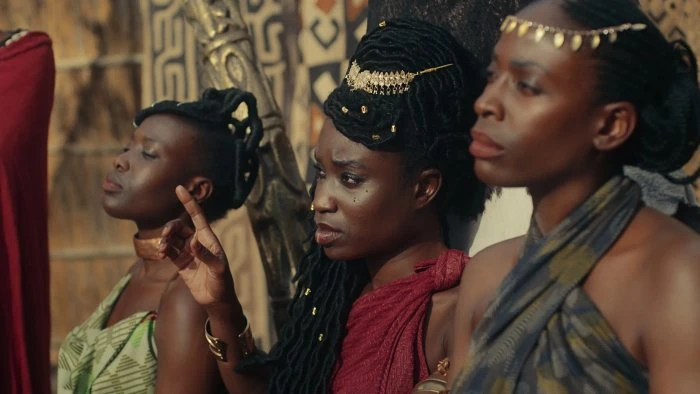
The dramatisation side of the documentary is handled well in spite of what looks like a limited budget. An engaging leading performance by Adesuwa Oni in the title role keeps us involved in her story. She has a nice chemistry with Marilyn Ndadebe and Chipo Kureya the actresses playing Njinga's younger sisters, and the affection between them gives what is in many ways a grim narrative, a human heart. Philips Nortey also deserves mention for giving a strong character arc to her brother Mbande, who goes from brutal ambition through confusion to broken disappointment.
Some of the support casting has obviously been done on the cheap: while it is possible that there were ginger Portuguese around in the 17th Century, the point is that, no disrespect to the actor, it disrupts immersion in what is supposed to be a recreation of history to see such apparently out of place people on screen. Nevertheless, it is a decent production of a good story and a couple more seasons like this would have proved the point that African Queens was there to make about strong black women in history who are worthy of greater attention.
That is the very point that was undermined by the decision to dedicate the second season to Cleopatra - the Cleopatra, or Cleopatra VII, to use the number usually assigned to her these days to distinguish her from all the other Cleopatras in the confusing Ptolemaic Dynasty. One can see why the producers thought the big star name would be good for marketing, but it immediately begged the question why they could not find any more actual black female rulers.
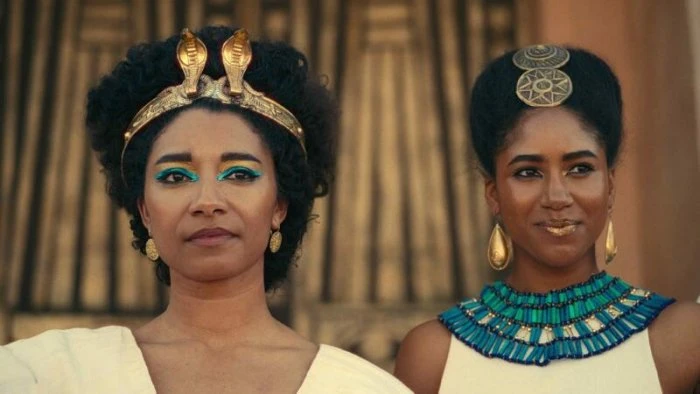
The claim that Cleopatra is black has been generally discredited. Given the complexities of Ptolemaic family relationships, we cannot say it is wholly impossible that she had a black ancestor somewhere, any more than it is impossible that she had a Scandinavian ancestor: it is just extremely unlikely. The Ptolemies were Macedonian and literally incestuous, and as a rule only those of "pure" Royal blood were acknowledged as such.
Yet it has to be said that in one sense it is unfair to pick on the miscasting of Casualty actress Adele James in the leading role, because neither do any of the other actors look anything like their historical counterparts. Even this might be forgivable - after all most of the many actors who have played Cleopatra and Mark Antony over the centuries have looked nothing like them but stuck fairly close to what Plutarch tells us about who they were. Your reviewer has seen a black Cleopatra on stage who was completely convincing. The problem with this Queen Cleopatra is that the writers seem to have done very little research. In the end, the colour of Cleopatra's skin is among the less important errors of fact in the production.
It does get some things right: most of the dates are correct.
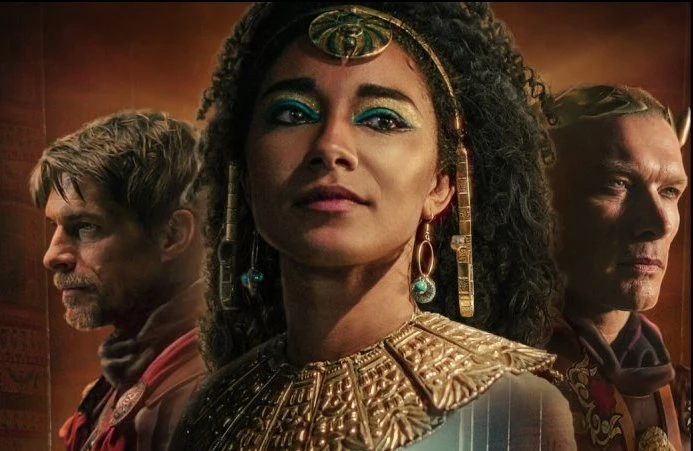
There have been less historical dramatised historical documentaries. For example, the season on Julius Caesar in the otherwise creditable Roman Empire, also produced for Netflix, which covered some of the same ground as Queen Cleopatra, was even inaccurate, more like a bad novelisation than a work of history. However, that there are worse examples of the genre does not alter the fact that Queen Cleopatra is still very bad history.
It is also very bad drama. James deserves credit for really throwing herself into her badly written role, but not only is she not the historical Cleopatra - she is also a character about whom one feels very little emotion of any sort. Whether Cleopatra is black or white does not really matter that much. What matters is that this Cleopatra is dull. No one ever said that about the original.
This failure to present an authentic Cleopatra, a well-known historical figure about whom most people know something, forces us to question the authenticity of the portrait African Queens gives us of Njinga, to whom the production introduces most of us for the first time. There is nothing wrong in writing with an agenda, but it offers no exemptions from the obligation to be accurate. On the contrary, it is all the more important to get your facts right when you have a point to make.
Seen this show? How do you rate it?
Seen this show? How do you rate it?
Published on March 24th, 2024. Written by John Winterson Richards for Television Heaven.


